Posted March 31, 2017 by Nicky in Reviews / 0 Comments
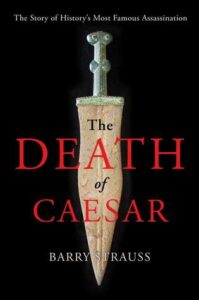 The Death of Caesar, Barry Strauss
The Death of Caesar, Barry Strauss
I was interested to read The Death of Caesar, since I’d read Barry Strauss’ work before — his book on Spartacus, for one, and the one on the Trojan War. I was less impressed with this one — it’s still informative and interesting, and it even pulled out things I didn’t know about the Ides of March and Caesar’s life in general. For example, if I’m thinking about the Ides of March, I’m thinking about Brutus and Cassius, and not about a guy called Decimus who didn’t even make it into Shakespeare’s version properly. And yet Strauss brings Decimus back into the foreground, pointing out how close he was to Caesar. If Caesar’s last words were “et tu, Brute?”, then he was referring to this Brutus: Decimus Junius Brutus Albinus.
But. The book didn’t have quite the energy I remembered from the book on Spartacus, and things seemed to drag on. Perhaps it’s because it doesn’t only cover the death of Julius Caesar, but also somewhat of the rise of Mark Anthony and Octavian (Augustus). It seems to wander a little from the point — but then, how would you write a whole book about the Ides of March? And doesn’t it make sense to cover the political fallout and the fate of the assassins?
So possibly I’m just being picky, but this didn’t feel as riveting as Strauss’ other books. Interesting, though, definitely.
Rating: 3/5
Tags: book reviews, books, history, non-fiction
Posted March 29, 2017 by Nicky in Reviews / 5 Comments
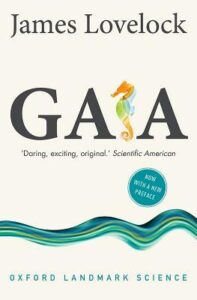 Gaia, James Lovelock
Gaia, James Lovelock
When I’ve heard of the Gaia theory before, I’ve usually heard of it in a sceptical sort of context that criticises the tree-hugging idea that Earth has a soul. That is not actually the main thrust of Lovelock’s argument at all: instead, what he argues is that Gaia, or Earth, is a self-sustaining system with in-built feedback loops which hold it more or less steady and capable of supporting life.
If you’ve studied climate or geology or even the water cycle, you know that he’s not wrong about the self-sustaining system. There’s so many negative feedback loops which keep things in check — some of which are, of course, threatening to be sabotaged by the action of one particular upstart mammal species with delusions of grandeur. We’re a part of the system, of course, but one which may have got out of hand. Or maybe not; maybe our intelligence will help rein us back in. We can only hope.
The point is, Lovelock’s not saying anything about a cosy loving Earth Mother spirit watching over us. Though his language in this book is sometimes poetical, and his sense of wonder at nature is clear, he’s talking about self-regulating, self-sustaining systems. He’s talking about the fact that the world has checks and balances in place which bring Earth into equilibrium, even though other factors — like the sun’s energy output — have changed over time. And okay, at some points he goes off on a tangent about whale intelligence and a hypothetical future in which whale brains give us technological advances, but the science here isn’t wrong.
There’s nothing actually revolutionary or tree-hugging here. It’s just true. Call it Gaia or call it a complex set of feedback loops; whatever you’re comfortable with, I guess. I do wish I’d read Revenge of Gaia instead, since this is horribly optimistic that humans will pull our collective fingers out and stop damaging the planet. I suspect Lovelock’s less sanguine about that prospect now.
Rating: 4/5
Tags: book reviews, books, non-fiction, science
Posted March 28, 2017 by Nicky in Reviews / 0 Comments
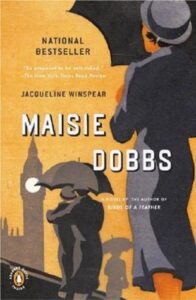 Maisie Dobbs, Jacqueline Winspear
Maisie Dobbs, Jacqueline Winspear
I had high hopes for Maisie Dobbs as the series that would take over from Phryne as my current new comfort reading. I don’t think Maisie is the detective for me, though; for a lot of this, it felt more like the focus was historical fiction that detective fiction. There’s a big digression in the middle which eventually leads up to Maisie’s interest in being a detective, but it’s mostly about her character and the issues of class she’s faced. There’s something very cold about it — for example, the fact that she never went to see the man she’d intended to marry after his operation. She feels more like Sherlock Holmes than Peter Wimsey. Which is fine, but not what I’m interested in.
In terms of the mystery, well, any sense of urgency gets taken away first by the fact that there’s a massive flashback section, and secondly by the fact that Maisie doesn’t face any of the dangers personally. She doesn’t even meet many of the characters involved in the mystery more than once or twice. And she relies heavily on a “shiver down her spine” to tell her what’s going on. Sure, instinct, okay, but… it’s just too perfect, too precise, even alongside the many notes she takes. It’s more like precognition than detection, and I don’t think it’s intended to be supernatural.
I might give the second book a try, because there are aspects of the character and the context that I quite enjoy. I was curious/interested enough to finish this book, after all. But I’m not really feeling it at this point.
Rating: 2/5
Tags: book reviews, books, crime, historical fiction, mystery
Posted March 27, 2017 by Nicky in Reviews / 0 Comments
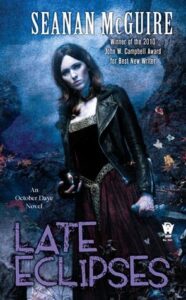 Late Eclipses, Seanan McGuire
Late Eclipses, Seanan McGuire
My year o’ Seanan McGuire continues! I don’t know why I never started the October Daye series before, because I do really enjoy them. Sometimes October herself can be annoying — stubborn, reckless, slow to grasp things which quickly become obvious to the reader, fickle about whether it’s Tybalt or Connor she wants to sleep with… But I enjoy her nonetheless, and especially the Faerie politics and lore that underlies her world.
In this one, we get a few more glimpses of the problems in the Torquil family, and a bit of an explanation for Amandine, and some things that didn’t seem quite right about Toby herself. Also, some of Tybalt’s quiet hints start to make sense, as does the Luidaeg’s dark mutterings. May Daye continues to be fun, while developments from An Artificial Night are also used to advantage. Characters from the earlier books appear, and some misunderstandings and old grudges are straightened out — somewhat.
In other words, it’s another fun outing with Toby which builds well on what’s come before. There’s some tragedy, too, which Toby is powerless to avert — a good lesson for the hero, and a warning to the reader that nothing is entirely safe, I think.
Rating: 4/5
Tags: book reviews, books, Seanan McGuire, SF/F
Posted March 26, 2017 by Nicky in Reviews / 0 Comments
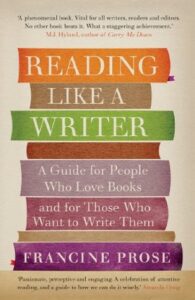 Reading Like A Writer, Francine Prose
Reading Like A Writer, Francine Prose
How lucky do you gotta be to have a name like that when you’re an author? Honestly, I hope it’s not a penname — it’s just too perfect.
The book, however… Well, I was hopeful when I read the first chapter. It talks about the value of close-reading, which I’m very much agreed with. I was taught close-reading by Professor Martin Coyle, and especially when it came to Sir Gawain and the Green Knight, it was revelatory. There’s so much there if you just focus deeply on the words of a text — references, clues, imagery, that you just might not register if you read fast. And I agree with Prose’s fears that literature is being taught as a mass of conflicting theories, to the exclusion of really understanding the nuts and bolts. While I am a new historicist, new/practical criticism has always been a huge help to me — and it continues to be so, even in understanding scientific writing.
If you’re interested in that kind of reading, though, I’d recommend Martin Coyle and John Peck’s Practical Criticism and Peck’s How to Study a Poet. You can also pretty much teach yourself by just looking hard at a poem — circle things that seem significant, underline, draw maps of how it works… You’ll likely see the value of it pretty quickly if it’s a way of thinking that will work for you. (And, bonus, both books are especially good if you want to learn how to communicate what you find via close-reading.)
However. The rest of the book mostly consists of extracts of what Prose has decided is “good writing”, almost all of it from very literary examples, and then her discussion of it. To me, this isn’t the way to learn how to read like a writer — if that is what this technique achieves — but just the way to learn how one writer reads. Not quite the same thing. It’s also notable that there’s no sign of genre fiction in here at all. Ms Prose, I do suggest you pick up some fine genre stylists; perhaps Ursula Le Guin? You might get a whole new education.
Rating: 2/5
Tags: book reviews, books, non-fiction
Posted March 25, 2017 by Nicky in Reviews / 0 Comments
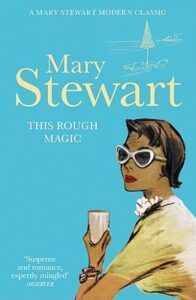 This Rough Magic, Mary Stewart
This Rough Magic, Mary Stewart
If you know Mary Stewart’s work, you know what to expect from this one — which is entirely why rereading her books is comfort reading for me, of course. It has danger, a plucky heroine, a mystery involving smuggling and, possibly, murder… and a handsome young man with whom, of course, the heroine falls utterly in love. Not without some rocky bits along the way, including not being entirely sure which one of the potential love interests is actually a bad guy.
The bad guy in this book gives me chills at times, in his utter amoral self-absorption. There are moments when you think he might be decent, but no. Still, I find the heroine’s relationship with both men delightful — she stands up for herself, gives as good as she gets, and weighs the evidence to come to a logical conclusion. No “but he seemed so nice” from this lady.
In terms of the usual sense of place and atmosphere you get with Stewart’s books, this one isn’t the best: it’s set on Corfu, and there are a couple of scenes early in the book which really do work. At other times, the condescension to the locals is just a bit too much, even allowing for the work as a product of its time.
Best character: the dolphin, of course.
Solidly enjoyable, featuring one of Stewart’s more resourceful heroines.
Rating: 3/5
Tags: book reviews, books, crime, Mary Stewart, mystery, romance
Posted March 24, 2017 by Nicky in Reviews / 2 Comments
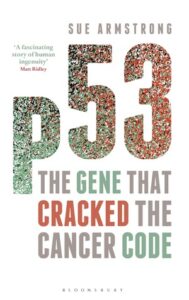 p53: The Gene that Cracked the Cancer Code, Sue Armstrong
p53: The Gene that Cracked the Cancer Code, Sue Armstrong
This is a good survey of the study of the p53 gene: one gene which turns out to have quite a bit influence on whether or not cancer develops in the body. It features some science, some history, some characters, and generally clear explanations of exactly how the science all works. It’s evident that it’s written by a journalist and not an expert, but that’s usually the perfect level for a casual reader anyway.
Now, if you don’t find cancer and how it progresses interesting, this will probably be lost on you. But if you have any interest, the background covered here is quite important to understanding cancer as a disease. It covers stuff like the “two hits” theory, why some children can be born with cancer, etc, etc. Enjoyable might be the wrong word for it, but I found it easy to read and informative.
Rating: 4/5
Tags: book reviews, books, non-fiction, science
Posted March 23, 2017 by Nicky in Reviews / 4 Comments
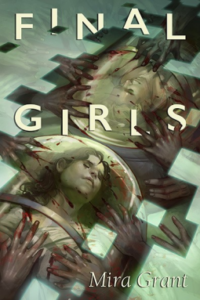 Final Girls, Mira Grant
Final Girls, Mira Grant
Received to review via Netgalley; release date 30th April 2017
This seems to be the year of Mira Grant aka Seanan McGuire, for me. I started the year with Rolling in the Deep, and I’ve read a couple of other Mira Grant and Seanan McGuire books since. Final Girls is what you’d expect of the Mira Grant half of the persona: a little horrifying, psychological, more towards the realistic speculative fiction end. This one examines the idea of a system that drugs people into receptivity, puts them into a simulated situation, and thus fixes their hangups and flaws. Sisters who hate each other can become friends, and lasting friendships can be forged based on fictional scenarios of blood and sacrifice and horror. It doesn’t even have to be that realistic: it just has to feel real.
One of the main characters, Esther, is sceptical about the truth of all this. It seems too good to be true, especially since her life was severely impacted by the false conclusions of people who went through regression therapy. As you’d expect, things go wrong.
Grant/McGuire’s writing is as good as usual, and the conclusion to the plot comes as a bittersweet surprise. Something is salvaged from the situation, but there’s a lot of damage along the way. Because it’s a novella, it doesn’t do more than hint at the long-term effects of the technology it explores. Instead, we experience it, its failures and its saving graces, through the characters. It works well.
Rating: 4/5
Tags: book reviews, books, Seanan McGuire, SF/F
Posted March 22, 2017 by Nicky in Reviews / 0 Comments
 Natural Histories, Brett Westwood, Stephen Moss
Natural Histories, Brett Westwood, Stephen Moss
If you’re pretty well versed in natural history and biology, this book won’t hold many surprises for you — though it might have a few titbits you’re unaware of. It’s certainly very readable, and the cover design is pretty darn awesome. And slightly creepy, in that way which things of nature can be. (I mean, have you ever seen a rabbit’s skull? Erk.)
It might be more enjoyable if read alongside or as a recap for the radio programme it was based on. As it is, it seems to hop around the animal kingdom rather randomly.
This may sound like damning with faint praise, but it’s just that the book isn’t really a good fit for me. And it did hold a few surprises.
Rating: 3/5
Tags: book reviews, books, non-fiction, science
Posted March 21, 2017 by Nicky in Reviews / 2 Comments
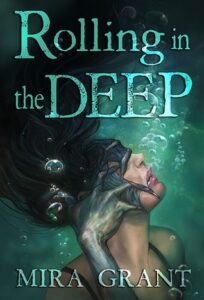 Rolling in the Deep, Mira Grant
Rolling in the Deep, Mira Grant
Rolling in the Deep is a documentary/found footage type story with a fairly predictable ending. Scientists, performers and television personalities go on a ship to find evidence of mermaids, with the scientists mostly using the opportunity to get some real work done without needing to charter the ship themselves. Everyone starts out sceptical, and the whole affair is rather cynical. The performers include professional mermaids — people who don mermaid outfits and swim in the sea to make it look like they really have found mermaids… or have they? Etc.
Naturally, this is a Mira Grant story and so things go wrong. The experiments disturb something real in the deep, and in the usual way of humans meeting other races, they cause harm. Cue the horror movie ending, and the later rediscovery of the empty, drifting ship… with some footage of the attacks intact. And of course, people ask if it’s real or not…
It’s a fun format and the story works well; it gets off to a bit of a slow start, which might disappoint horror fans. There’s a few too many characters in the space to really get attached to any of them, though one or two show promise. Not my favourite of Grant’s novellas, but definitely a good read.
Rating: 3/5
Tags: book reviews, books, Seanan McGuire, SF/F
 The Death of Caesar, Barry Strauss
The Death of Caesar, Barry Strauss








